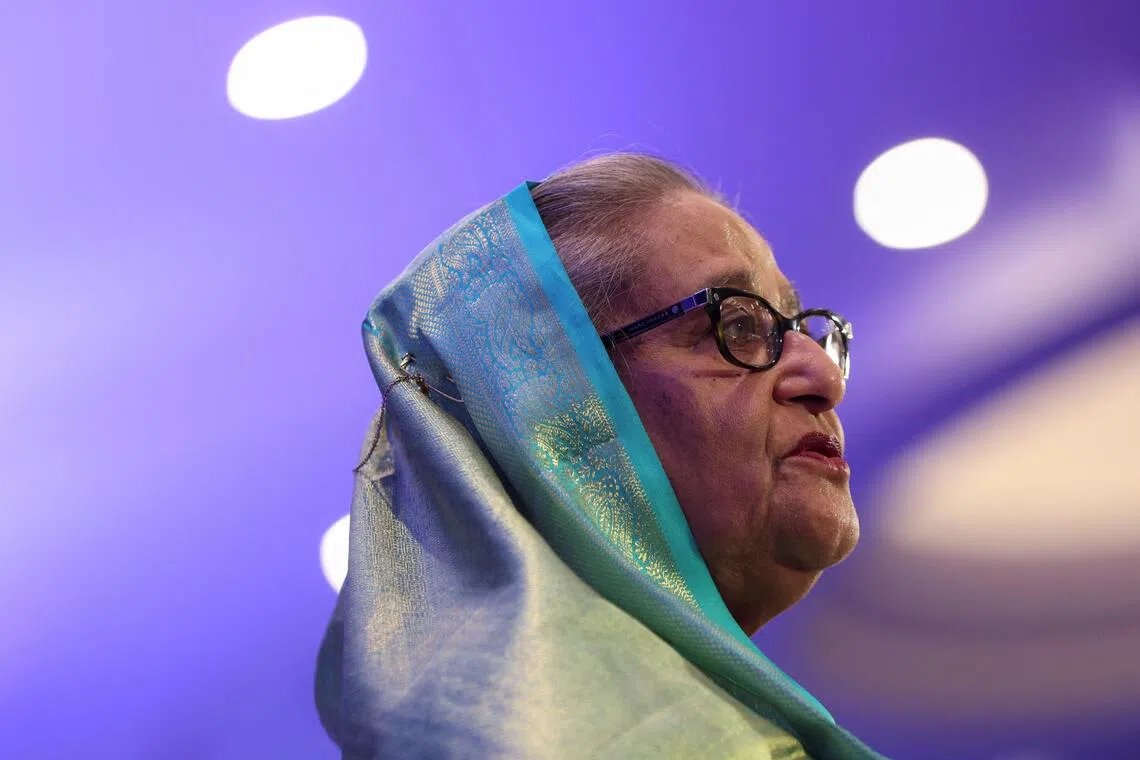Bangladesh’s ousted PM Hasina sentenced to death in absentia for crackdown on students
Sign up now: Get ST's newsletters delivered to your inbox

Sheikh Hasina remains in exile in New Delhi after fleeing Bangladesh in August 2024.
PHOTO: REUTERS
Follow topic:
DHAKA - A Bangladesh court sentenced ousted prime minister Sheikh Hasina to death on Nov 17, concluding a months-long trial that found her guilty of ordering a deadly crackdown on a student-led uprising in 2024.
The ruling is the most dramatic legal action against a former Bangladeshi leader in decades and comes months ahead of parliamentary elections expected to be held in early February.
Hasina’s Awami League party has been barred from contesting and it is feared that the verdict could stoke fresh unrest ahead of the vote.
The International Crimes Tribunal, Bangladesh’s domestic war crimes court located in the capital Dhaka, delivered the guilty verdict amid tight security and in Hasina’s absence after she fled to India in August 2024
Hasina, 78, got a life sentence under charges for crimes against humanity and the death sentence for the killing of several people during the uprising.
Cheers and claps broke out in the packed courtroom after the death sentence was pronounced.
The verdict can be appealed in the Supreme Court. But Hasina’s son and adviser Sajeeb Wazed told Reuters on the eve of the verdict that they would not appeal unless a democratically elected government took office with the Awami League’s participation.
Bangladesh’s interim government called the death sentence a “historic verdict” and warned that any attempt to create chaos and disorder would be dealt with strictly.
The government urged India to extradite Hasina and former interior minister Asaduzzaman Khan Kamal, who was also sentenced to death over the crackdown against the student uprising in 2024.
Dhaka said New Delhi was obliged to do so under an extradition treaty.
India said it noted the verdict and would “engage constructively”, without going into more detail.
Reacting to the verdict, Hasina said the ruling had come from a “rigged tribunal” established and presided over by an unelected government with no democratic mandate.
“They are biased and politically motivated,” she said in an e-mail statement sent to media outlets soon after the verdict.
“In their distasteful call for the death penalty, they reveal the brazen and murderous intent of extremist figures within the interim government to remove Bangladesh’s last elected prime minister, and to nullify the Awami League as a political force,” she said.
Worst violence since 1971
During the trial, prosecutors told the court that they had uncovered evidence of her direct command to use lethal force to suppress the student-led uprising
According to a United Nations report, up to 1,400 people may have been killed during the protests between July 15 and Aug 5, 2024, with thousands more injured – most of them by gunfire from security forces – in what was the worst violence in Bangladesh since its 1971 war of independence.
Hasina was represented by a state-appointed defence counsel who told the court that the charges against her were baseless and pleaded for her acquittal.
Ahead of the verdict, Hasina had dismissed the accusations and the fairness of the tribunal proceedings, asserting a guilty verdict was “a foregone conclusion”.
But the interim government rejected those charges.
“The tribunal has functioned transparently, allowing observers and publishing regular documentation,” a government spokesperson told Reuters hours before the verdict. “No credible human rights body has described the current process as politically driven.”
Bangladesh has been tense ahead of the verdict, with at least 30 crude bomb explosions and 26 vehicles torched across the country over the past few days. There were no casualties.
The Muslim-majority South Asian country of 170 million people has been governed by an interim administration headed by Nobel Peace laureate Muhammad Yunus since Hasina fled. Although the country has been largely peaceful since, political stability is yet to return.
In an interview, Hasina warned of growing anger among supporters of the Awami League and said that millions of party loyalists would boycott the parliamentary elections in February.
On Nov 17, security remained tight across Dhaka and other major cities, with paramilitary forces deployed around key government buildings and the tribunal complex. The authorities said they were prepared for any trouble after the verdict. REUTERS

